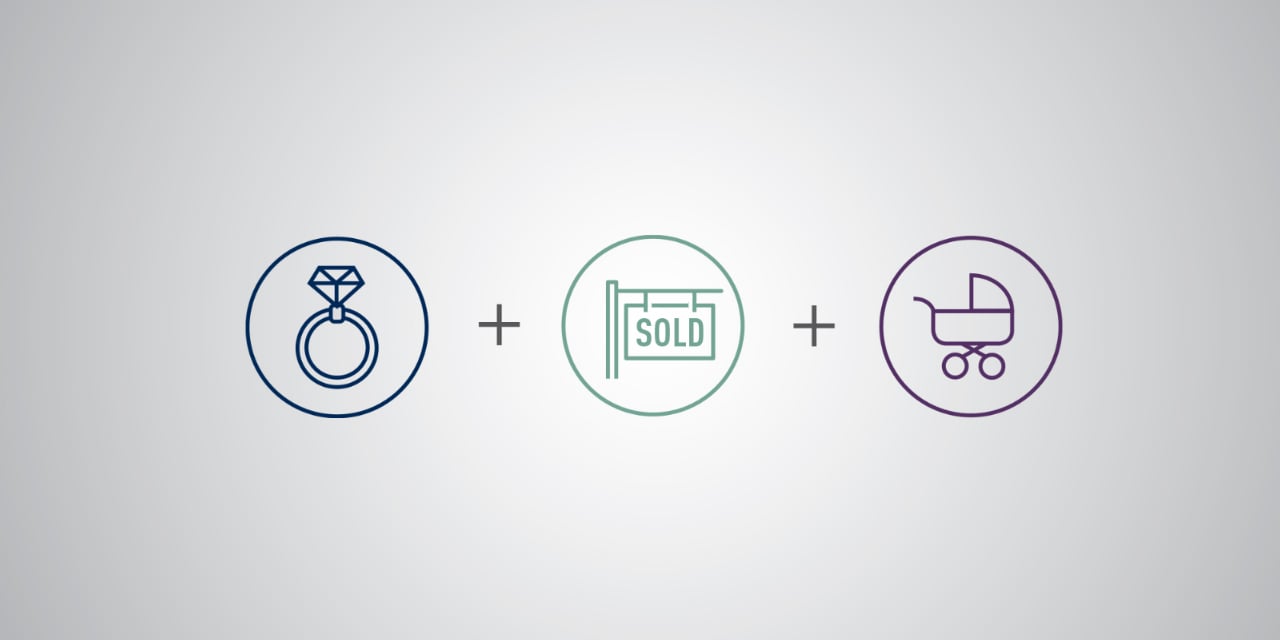
Wealth Management in Real Life
Question
I just got engaged and I’m really excited for the future. My fiancé and I are trying to figure out how to merge our finances, and we’re thinking about buying a house and maybe having a kid in a couple years. What should we be thinking about so we can financially plan ahead?
Answer
Congratulations! You’re entering a very exciting time of life, and you have a lot of major, interconnected decisions to make as you and your fiancé start a life together. It can be overwhelming to try to plan for all these milestones at once, so we suggest taking things one step at a time, getting on the same page as a couple and creating a plan.
Here are a few things to keep in mind as you plan ahead for some of your life’s milestone moments:

Getting Married
Being open and honest about finances with your partner is an important first step for soon-to-be married couples. These steps can help you form a shared vision for your financial future:
- Get in the habit of talking about money as a couple on a regular basis. Know each other’s credit scores, income, and debt and savings habits and learn each other's financial perspectives and goals.
- Talk about if and how to merge your finances. You can set up joint accounts, keep your money separate or find a combination of the two. Think about what would be the best approach for you as a couple.
- Create a joint budget and watch your spending, especially on larger purchases. This will help you prepare for big-ticket expenses down the road.
- Update important documents after you get married. With a new spouse and potentially a new name, it’s the perfect time to revisit (or create) your will, living will, trust, powers of attorney and beneficiaries.

Buying a House
Purchasing a home is one of the biggest investments you’ll make as a couple. If you work as a team, you can avoid expensive surprises during your home-buying journey. Here’s what you should know before you start looking at properties:
- If you need to, take steps to build up your credit score, minimize debt and build up savings before you get on the property market.
- Weigh the advantages of renting versus buying. This goes deeper than monthly payments – be sure to weigh how long you want to stay in your area and if you’re ready to absorb the extra costs of home ownership, like maintenance, property taxes and insurance.
- Keep in mind a mortgage lender will tell you how much you will be approved to borrow – not how much you can afford. You may be approved for more than you can comfortably spend. Search "home affordability calculator" online, and you'll find many tools to help you ballpark a price you can actually afford.
- Strive to save at least 20% for a down payment. If you put at least that amount down, you'll avoid private mortgage insurance (PMI), which is an added expense on top of your monthly mortgage payment.
- Don’t forget about extra expenses tacked on to a home’s purchase price. Save extra money to cover one-time costs like brokers' fees, appraisal fees and closing costs.
- Revisit your budget and add a line item for home maintenance. Many experts suggest budgeting 1% of your home's value each year to cover maintenance costs. You might need to up the amount if you buy a historic home.
- Think about buying life insurance. When you start to take on significant debt as a couple, like a mortgage, life insurance can help cover those obligations if something happens to one of you.

Starting a Family
Having a baby changes everything – including your family’s financial picture. Here’s how you and your spouse can financially prepare for a new arrival:
- Re-evaluate your budget and savings priorities if you’re thinking about starting a family. How would having children change your plans for saving for retirement, a second home, new car or other goals? Babies come with a lot of expenses – plan for them in advance so you aren’t caught off guard when the time comes.
- Understand your health insurance. Plan for increased medical expenses and compare benefits packages to see what coverage would be best for your growing family.
- Revisit your life insurance coverage. A new baby may mean it's time to pick up or increase your coverage. You might also consider adding disability, property or liability coverage.
- Add your baby to your medical insurance. Do this sooner rather than later – many plans only give you 30-60 days from the child’s date of birth to add them to your plan.
- If you don't have an estate plan, a new baby is the perfect prompt to create one. Sit down with an attorney to draft or update your will, and be sure to choose a guardian for your child(ren).
The future you want for yourself and your family doesn’t just unfold on its own – you make it happen with careful planning and smart financial choices. If combining households, buying a home and starting a family seems like a lot to handle, that’s okay. Baird is here to help you navigate life’s big decisions while keeping your long-term goals in mind.
Got a question for our wealth management experts? Send us a message and your question might appear in a future installment of “Wealth Management in Real Life.”


